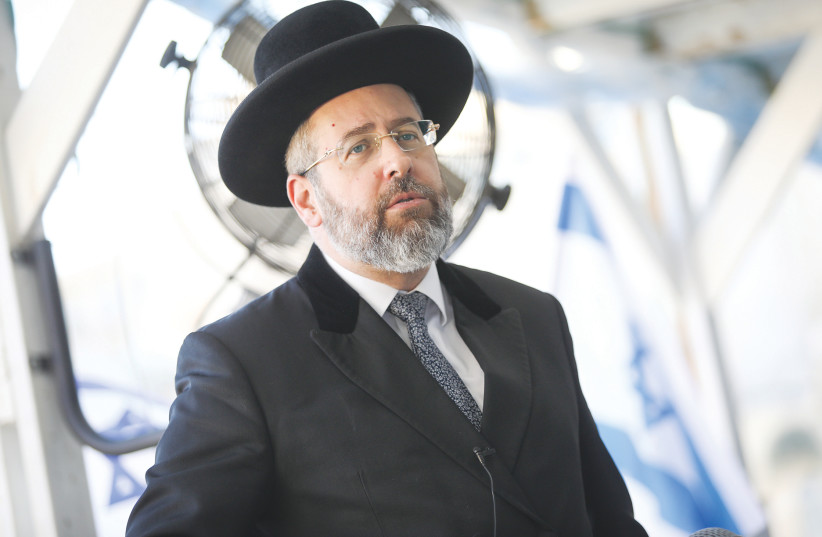Chief Rabbinate declares it will not cooperate with gov't kashrut reforms
Chief Rabbi Lau said that religiously traditional Israelis and foreign visitors will not be able to understand the differences between competing kashrut authorities

Chief Ashkenazi Rabbi David Lau.
The Chief Rabbinate has declared it will not cooperate with the government’s proposed reforms to the kashrut supervision system, describing them as “dangerous” and “the destruction of kashrut and Judaism in Israel.”
Following
a meeting of the rabbis of the Council of the Chief Rabbinate on
Monday, the organization’s executive arm, the body issued a decision
stating that any rabbi utilizing the proposed reforms would violate
Jewish law and said it would not accept the dictates of the religious
services ministry on the issue.
The
decision was signed by head of the council Chief Rabbi Yitzhak Yosef
and the 11 other members of the council, while Chief Rabbi David Yosef,
applauded the decision.
Religious Services Minister Matan Kahana did not immediately respond to a request for comment.
Last
month, Religious Services Minister Matan Kahana announced a program of
reform which would allow independent kashrut authorities headed by a
Chief Rabbinate-qualified rabbi to provide kashrut supervision, with the
Chief Rabbinate establishing standards and functioning as a regulator,
including operating an inspection authority to oversee the work of the
independent kashrut authorities.
Additionally,
if independent authorities seek to operate under alternative standards a
municipal chief rabbi together with two other rabbis with
qualifications to serve as municipal chief rabbis, could establish their
own kashrut authority under their own guidelines, which would still be
subject to the Chief Rabbinate’s inspection authority.
These measures would abolish the Chief Rabbinate’s monopoly
over kashrut licensing, which has been described by state comptroller’s
reports as suffering from severe deficiencies and from corruption.
“The
Council of the Chief Rabbinate declares that according to Jewish law it
is forbidden for a rabbi to give kashrut [certification] or deal with
kashrut issues outside of his [municipal] boundaries in a place where
another rabbi is serving,” wrote the council in its decision on Monday.
The
council was referencing the requirements of the proposed reforms in
which the independent kashrut authorities which will be established must
be headed by a rabbi with qualifications from the Chief Rabbinate to
serve as a municipal chief rabbi.
That
authority will be able to provide kashrut licensing and supervision
anywhere in the country, as opposed to the current system in which only
the local municipal chief rabbi and rabbinate can grant a kashrut
license.
“The
Council of the Chief Rabbinate was established (by law) in order to give
instructions in Jewish law to the people, and will not cooperate with
the decision to turn it [the Chief Rabbinate] to a council which accepts
dictates in order to implement political policies which contravene
Jewish law. Principles of Jewish law are not up for negotiation, the
Torah of Israel cannot be changed.”
CHIEF RABBI David Lau gave backing to the council’s decision, and also denounced the reforms.
Lau
delineated his opposition to the reforms in a letter to his colleague
Chief Rabbi Yitzhak Yosef welcoming the Council of the Chief Rabbinate’s
opposition to the proposals on Monday.
In
his letter, Lau claimed that religiously traditional Israelis and
tourists would suffer from the reforms, which are now part of the state
budget’s arrangements law, since they would not know how to discern
between reliable and unreliable kashrut authorities.
He
also attacked the central notion of the reforms of creating competition
between kashrut authorities, saying such competition would harm the
level of kashrut.
And
he also criticized Kahana’s proposals, without mentioning him
explicitly, for not consulting with a committee of the Chief Rabbinate
established to examine options to improve the quality of kashrut
supervision in the country.
The
committee was established back in March 2016 and it made modest
proposals for reform which were never implemented by the Chief
Rabbinate.
And he
attacked the “three rabbis” alternative track for establishing a
kashrut authority, saying such rabbis would lack experience in kashrut
supervision, and compared the track to an alternative health ministry
run by three coronavirus denying doctors.
Lau
also alleged that those who were happy with the proposals were among
those who “harm the Jewish character of the State of Israel,” saying
that this fact “proves the proposals are not designed to help Judaism.”
He
said he hoped the Council of the Chief Rabbinate would convene shortly
“to discuss how Israel’s rabbis should act on this issue,” as well as
how to react to coming reforms to the conversion process that Kahana
also plans to introduce.







No comments:
Post a Comment